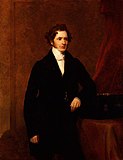
Back যুক্তরাজ্যের সাধারণ নির্বাচন, ১৮৫২ Bengali/Bangla Elecciones generales del Reino Unido de 1852 Spanish Élections générales britanniques de 1852 French הבחירות הכלליות בבריטניה 1852 HE Elezioni generali nel Regno Unito del 1852 Italian 1852년 영국 총선 Korean Парламентские выборы в Великобритании (1852) Russian Парламентські вибори у Великій Британії 1852 Ukrainian
| |||||||||||||||||||||||||||||||||||||
All 654 seats in the House of Commons 328 seats needed for a majority | |||||||||||||||||||||||||||||||||||||
|---|---|---|---|---|---|---|---|---|---|---|---|---|---|---|---|---|---|---|---|---|---|---|---|---|---|---|---|---|---|---|---|---|---|---|---|---|---|
| |||||||||||||||||||||||||||||||||||||
 Colours denote the winning party—as shown in § Results | |||||||||||||||||||||||||||||||||||||
 Composition of the House of Commons after the election | |||||||||||||||||||||||||||||||||||||
| |||||||||||||||||||||||||||||||||||||
The 1852 United Kingdom general election was held between 7 July 1852 and 31 July 1852 to elect members of the House of Commons, the lower house of Parliament of the United Kingdom. It was a watershed in the formation of the modern political parties of Britain. Following 1852, the Tory/Conservative party became, more completely, the party of the rural aristocracy, while the Whig/Liberal party became the party of the rising urban bourgeoisie in Britain. The results of the election were extremely close in terms of the numbers of seats won by the two main parties.
As in the previous election of 1847, Lord John Russell's Whigs won the popular vote, but the Conservative Party won a very slight majority of the seats. However, a split between Protectionist Tories, led by the Earl of Derby, and the Peelites who supported Lord Aberdeen made the formation of a majority government very difficult. Lord Derby's minority, protectionist government ruled from 23 February until 17 December 1852. Derby appointed Benjamin Disraeli as Chancellor of the Exchequer in this minority government. However, in December 1852, Derby's government collapsed because of issues arising out of the budget introduced by Disraeli. A Peelite–Whig-Radical coalition government was then formed under Lord Aberdeen. Although the immediate issue involved in this vote of "no confidence" which caused the downfall of the Derby minority government was the budget, the real underlying issue was the repeal of the Corn Laws which Parliament had passed in June 1846 and had split the Conservative Party. In this election, there were 18 Peelites elected in England and Wales. The constituency of St Albans (UK Parliament constituency), with its two members, was disfranchised due to corruption. This accounts for the fact that there were two fewer seats in the House of Commons as compared to the previous election, though no redistribution took place.
Cite error: There are <ref group=lower-alpha> tags or {{efn}} templates on this page, but the references will not show without a {{reflist|group=lower-alpha}} template or {{notelist}} template (see the help page).

